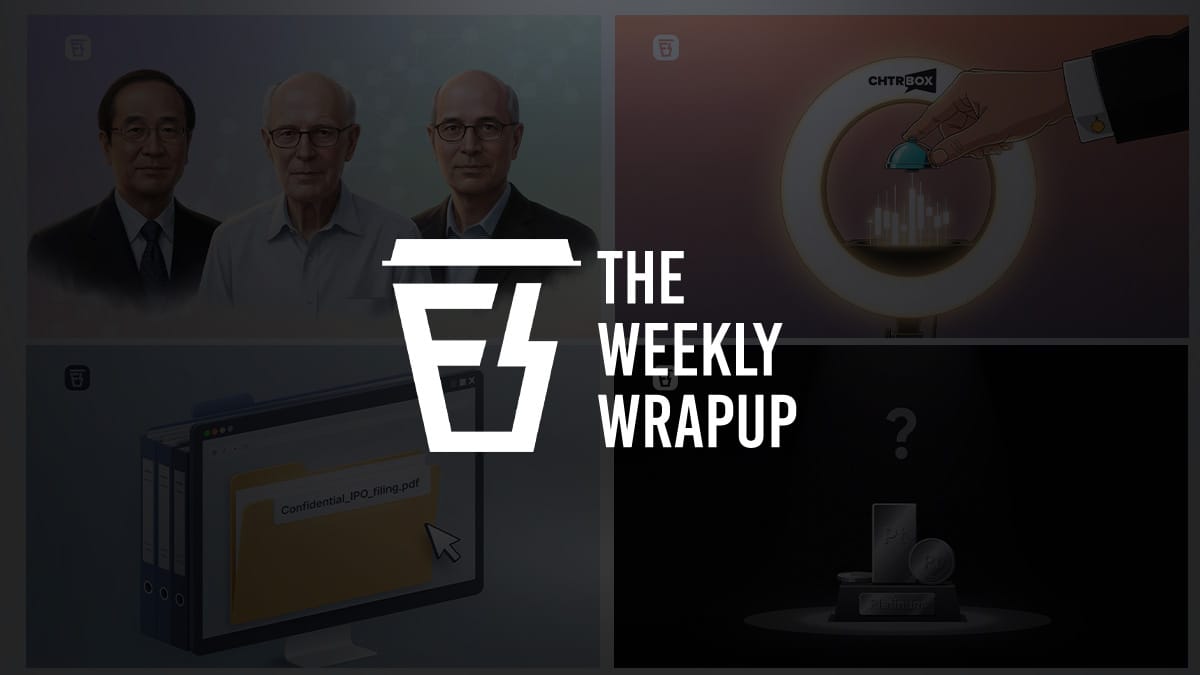The LG Electronics IPO, Platinum’s rise, Nobel Prize in Chemistry, Chtrbox and more…

In this week’s wrapup, we talk about the cyberattack on Jaguar Land Rover, the LG Electronics India IPO, why Indian companies are opting for the confidential IPO route, why platinum is on the rise, and the Nobel Prize in Chemistry.
And in this week’s Markets edition, we talk about Chatterbox Technologies — the first listed influencer marketing company in India. We explore whether this could evolve into a new sector, how the company’s business model works, and how do you value it? Click here to read the full story.
Also, before we dive in, here's a quick sidenote: 0% GST on insurance is good news. Life and health policies are now more affordable but... knowing how to choose the right one still matters more than ever.
That's why we're conducting a 2-day Insurance Masterclass that will breaks down both life and health insurance in simple, actionable steps so you can make better financial decisions. Only 230 seats remaining. 👉🏽Register here for the sessions on October 15th and 16th.
And with that out of the way, let’s look back at what we wrote this week.
Why UK manufacturing couldn’t afford a JLR on crutches
When a cyberattack shut down Jaguar Land Rover’s production lines, it didn’t just stall car deliveries but shook up an entire supply chain that fuels Britain’s manufacturing backbone.
That outage, for a sector already struggling with productivity and inflation, was a harsh reminder of its digital vulnerabilities. It exposed just how fragile the UK’s manufacturing backbone really is.
But the real question is whether this was a one-off disruption or a sign of deeper structural weakness. Because JLR isn’t just any automaker. It’s the flagship of Britain’s industrial identity.
So we talked about what this all says about the country’s manufacturing ambitions and why cybersecurity is now just as important as the assembly line in our Monday’s story.
The LG Electronics India IPO
LG Electronics India geared up for one of the biggest Indian IPOs this week. And this time, it’s not a tech startup but an old-school electronics giant.
That alone makes it interesting, since it’s a rare crossover between consumer nostalgia and capital markets ambition. It could redefine how global consumer brands approach India’s capital markets. After all, we’re talking about a household name testing investor appetite in a category dominated by homegrown players.
So in our Tuesday newsletter, we broke down why LG is going public, how it stacks up against peers like Samsung and Haier, and what this listing could mean for both consumers and investors.
Understanding confidential IPOs
You’ve probably seen companies announcing IPO plans months in advance. But lately, some have been going quiet.
Because not every company wants the spotlight. That’s where confidential filings, a tool that lets firms test market waters without all the public scrutiny, enters the picture.
The practice isn’t new globally, but it’s catching on in India as more startups look for flexible timelines and less pressure from early disclosure. For founders, it’s a way to dodge scrutiny until they’re ready to go all in, without giving out the trade secrets.
But how do confidential IPOs work? Will more firms prefer them soon? And what are the downsides? That’s what we try to answer in our Wednesday’s story.
Gold is cool, but what about Platinum?
Gold always steals the spotlight be it in jewelry, central banks, and safe-haven portfolios. But quietly, another precious metal is making a case for itself: platinum.
Unlike gold, platinum’s value isn’t just emotional or financial but industrial. From catalytic converters to hydrogen fuel cells, its applications are spreading across the green transition economy. Demand is soaring thanks to the green energy shift. But supply isn’t enough because this rare earth metal isn’t even from planet Earth!
Our Thursday newsletter explores whether this metal can truly dethrone gold’s dominance and what it could mean for investors.
Why the Nobel Prize in Chemistry went to Kitagawa, Robson and Yaghi
Three scientists. One award. And discoveries that are redefining how we think about molecular architecture.
This year’s Nobel Prize in Chemistry went to Kitagawa, Robson, and Yaghi for their pioneering work on metal-organic frameworks (MOFs). These are materials that act like molecular sponges. And the trio's research is transforming how we capture carbon, purify water, and store gases.
It’s chemistry with real-world consequences, not just lab theory. And we traced how decades of quiet research led to one of the most practical scientific breakthroughs in years in our Friday’s newsletter.
Liked this week’s wrapup?
Don’t forget to hit share on WhatsApp, LinkedIn, and X.
🖖🏼
